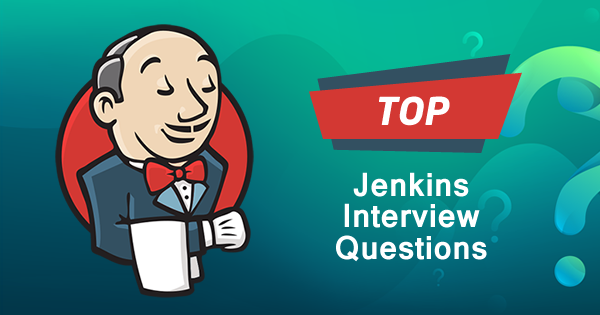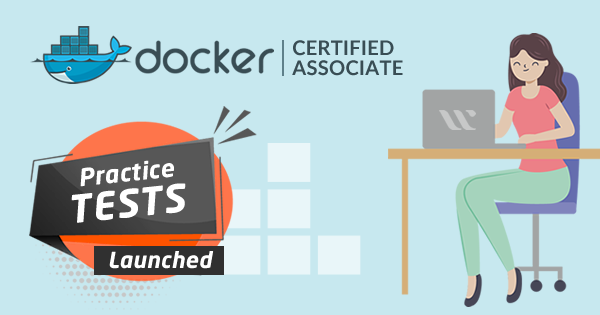Written in Java, Jenkins is one of the most popular DevOps tools. It is widely known as a continuous integration tool and enables software developers to employ any changes in the program or project. That’s why most developers want to know about Jenkins interview questions while going for their interview.
Well, before exploring top Jenkins interview questions, you should obtain some basic knowledge on Jenkins. In general, when a developer develops the model, after sanity tests, he sends it for testing. During the development stage, the testers are free. However, when it faces a lot of errors, they get overloaded.
Enroll Now: Certified Jenkins Engineer Online Course
This ultimately led to confusion and created a disturbance in the development process. Through continuous integration, the developers change the codes every day. After that, the testers check and identify the issues in the program in its early stage. However, all these processes consume a lot of time. That’s why developers use Jenkins platform. In short, this fantastic platform automates all the processes. For example, program development, deployment, checking, and program analysis; Jenkins makes the software development process faster.
Most Common Jenkins Interview Questions and Answers
Just change the source code repository, and it will automate the process using the plugins. It is one of the most major tools among DevOps professionals. So, if you are going for a job interview for DevOps, you may face a lot of Jenkins interview questions for DevOps engineer. Curious to explore more about frequently asked Jenkins interview questions? Let’s get started with some best Jenkins interview questions.
1. What do you mean by Jenkins?
Answer: If you are looking for Jenkins interview questions for DevOps engineer, then this is a major one. If this is the question, then start with a definition of Jenkins. It as a Java-written automation tool. Jenkins simplifies the development cycle with its continuous integration feature. The developers use this tool to create and test the projects and to integrate the necessary changes quickly. You can go for unlimited testing and technology deployment with Jenkins. This is a basis Jenkins interview question that you can face during your DevOps interview.
2. What are the major benefits of Jenkins tool?
Answer: This is one of the most frequently asked Jenkins interview questions. However, the significant benefits of Jenkins opensource integration tool are:
- During the change integration level, failures are cached.
- When you do any changes, it generates build report notification.
- It has LDAP mail servers and let the developers know about the success or failure report.
- With some simple steps, you can automate the project.
- It tracks the bugs from the project’s initial stage.
3. What are the important features of Jenkins tool?
Answer: This is one of the most major Jenkins interview questions that every employer asks. However, here you can say like, this amazing tool comes with many great features. These are:
- Continuous delivery and integration
It is an automation server; Jenkins is used as a CI server. Besides, you can turn Jenkin into a delivery platform for different projects. It dramatically simplifies the project process.
- Easy installation
It is a java-based and straightforward program. The tool is ready to run without any further configuration process. Besides, the best thing about Jenkins is it is highly compatible with Mac OS, Windows, and Linux operating systems.
- Easy to configure
You can easily set up the program through the easy-to-use web interface. Besides, you can use the on-the-fly error checks and help features in-built in the program.
- Useful plugins
You will find hundreds of useful plugins in its Update Center. Moreover, it easily integrates with most of the tools in the continuous delivery toolchain.
- Highly extensible
You can easily extend Jenkins through its unique plugin architecture. With such a feature, you can do a lot of things using Jenkins.
- Distributed
It distributes works over different machines, simplifying the process of built, test, and deploy on various platforms.
4. How to configure a job in Jenkins?
Answer: When it comes to the latest Jenkins interview questions, you can’t ignore this one. To set up a job, first, you need to create a job. For this, go to the new job section, locates on the top page and developing a freestyle project. Talking about some of the major elements of the projects are:
- You will need a Subversion to store the source codes.
- While performing the builds, you will require triggers.
- You will have to develop some scripts like Ant or Maven.
However, if you have any doubt, DevOps and Jenkins interview questions, you can take the help of different online DevOps communities.
Also Read: Top 10 DevOps Tools
5. What do you mean by Continuous Integration (CI)?
Answer: In general, this is a software engineering practice where different changes are tested immediately. Besides, it reported about the addition of the revisions to a more massive codebase. In detail, under this, a developer integrates codes frequently into the shared repository. Then, the integrations are verified through an automated test. If you are looking for such most popular Jenkins interview questions, then search on the internet.
6. Can you name some CI Tools used in Jenkins?
Answer: Talking about Jenkins supported Continuous Integration tools are:
- GitLab CI
- Travis CI
- Jenkins
- Team City
- Bamboo
- Circle CI
- Go CI
- Codeship
7. What do you mean by DevOps and how it relates to Jenkins?
Answer: This is one of the latest Jenkins interview questions. However, moving to the answer is software development practice. In detail, DevOps combines software development and IT operations. With this, it makes the entire development process a lot easier and faster. Furthermore, it provides the developer with fixes, features, and significant updates. Jenkins, in this practice, helps by automating the process of development, test, and deployment.
8. What do you understand by Pipeline in Jenkins and steeps included in it?
Answer: Such Jenkins pipeline questions are quite common and come in the set of Jenkins interview questions. However, the Pipeline is a plugin that helps to integrate and implement delivery Pipelines. In general, a Pipeline may include developing projects, integration, testing, and deployment of the project. So, talking about the steps in the Jenkins Pipeline, these are built, test, and deploy.
9. What is the agent directive in Jenkins platform?

- All the processes included in the block are arranged for the execution. The operations begin when an executor is available.
- A workplace is assigned, which can store all the files moved from the source control and working files.
- When you face any issue in finding suitable answers to Jenkins interview questions, you can take the help of experts.
10. What is CI CD Pipeline?
Answer: This is one of the most common Jenkins interview questions and can be answered as follows. CI or CD (Continuous Delivery) Pipelines includes built, test, and deploy Pipelines. In general, it saves a lot of time and prevents error in project builds maintenance. CD Pipeline is a group of developed jobs, integrated and chained in a proper sequence. 11. Can you tell about Scripted Pipelines with the syntax?
Answer: The scripted pipelines follow the below mentioned groovy syntax:
Node {
}
In detail, the Node is a significant part of Jenkins architecture. There are two different types of Nodes which deal with various tasks. Besides, agents handle the tasks individually. Most of the employer will ask you such Jenkins pipeline questions.
12. What do you mean by declarative pipelines in Jenkins tool?
Answer: Declarative Pipelines are recently added in Jenkins tool. It greatly simplifies Jenkins Pipeline’s groovy syntax. However, there are some exceptions. For example,
- You can’t use a semicolon to separate a statement.
- Upper-level pipelines should enclose in blocks.
13. Explain what is an agent in the Jenkins tool.
Answer: Are you in search of top Jenkins interview questions? Well, here is one. In detail, this section tells where the entire Pipeline will carry out in Jenkins. Furthermore, the section is defined at the upper level in the block, but it is optional.
14. What are the Parameters in Jenkins?
Answer: To provide different use-cases the Pipeline, the agent supports some parameters. In detail, the parameters are applied at the upper level of the block.
15. What do you mean by post?
Answer: It defines some additional steps that run after the completion of the Pipeline. However, it depends on the post section’s location. It supports different postcondition blocks, for example, failure, always, success, failure, aborted, and unstable.
Getting a certification is a good way to recognize and validate your DevOps skills. Get one of the Best DevOps Certifications and take your DevOps career one level up.
16. What are the stages?
Answer: Under this section, you can find the work described by the Pipelines. In detail, it contains one and multiple directives. Every stage should contain a stage directive for every discrete part of the delivery process. For example, develop, test, and deploy.
17. What is the environment directive?
Answer: It shows a particular sequence of environment variable pairs for different steps or stages. However, it depends on the location of the environment directive within the Pipelines.
18. What do you mean by Triggers?
Answer: These directives tell about how the Pipelines re-trigger during a process. However, the Pipelines integrates with the sources, for example, GitHub, don’t need the triggers. The reason is the presence of webhooks-based integration. So, the available triggers are Upstream, PollSCM, and Cron.
19. Can you explain about input directives?
Answer: When it comes to some major Jenkins interview questions, don’t forget to know about input directives. Most of the employers ask this question. However, the answer is it lets the developers encourage for input, through input steps. In general, the stage will stop when you apply any options. Then when you input something, and it gets approved, then the stage will continue. The input parameter is easily detectable in this environment throughout the process.
20. What do you mean by the term Parallel in Jenkins platform?
Answer: Stages present in declarative pipelines can sometimes show some nested stages. These stages are executable in Parallel. However, remember that each stage should have one parallel. As per the rule, the nested stage can’t carry further parallel stages but can behave as any other stage. Furthermore, a stage which includes Parallel can’t carry tools or an agent as they are irrelevant.
21. How you can make sure that the project build will not break in Jenkins?
Answer: To make sure about this, one can consider the below-mentioned steps:
- Take time and do a clean installation of Jenkins with all unit tests on your machine.
- Now make sure that all the code changes reflect successfully.
- Besides, don’t forget to check the repository synchronization.
This way, you can make sure that all the changes and settings are stored in repository synchronization.
22. What are the steps to create copy and backup files through Jenkins tool?
Answer: To create backups of the file, then you should backup the Jenkins_Home directory every day. The reason is Home Directory houses all the configurations of jobs and build history. For Jenkins backup, just copy the job director to a clone. Besides, you can even rename the directory.
23. Can you explain the process to secure Jenkins?
Answer: Well, this is one of the most critical Jenkins interview questions. However, you can explain the process in the following manner. First of all, ensure global security. After that, make sure, Jenkins is properly integrated with the directory by right types of plugins. In general, the project matrix is enabled to simplify access. Besides, you can automate or privileges by a custom-controlled script. There is limited access to the data. To check its security level, you can run security audits.
24. What you will do if you found a broken build in the Jenkins project?
Answer: First of all, you need to access the output console. There you can find the broken build. Then, in the console output lookout for any file changes that are not there. If you don’t find any problem with this process, then try to update your workspace. Then you can replicate the issues and can solve it.
25. What is the process to copy or mover the jobs from one server to another?
Answer: For this, copy your old Jenkins project directory to a new server. You can do it in different ways. For example, you can mover the project from installation to the corresponding project directory. Besides, you can also create a clone of the directory by creating a copy of the existing project.
If you still have some doubts and looking for such basic yet important Jenkins interview questions, you can search online.
26. What is the process of scheduling builds in Jenkins platform?
Answer: To schedule the builds in Jenkins, follow the below-mentioned steps:
- First, make sure you have a source code management commit.
- Then you need to finish all the remaining builds.
- You need to schedule it to start at a particular time.
- Then request for a manual build.
27. What are the commands that one can use to begin Jenkins manually?
Answer: For this, you can go through the following flow:
If you want to Jenkins manually start command line, and then you need to open the installation directory of Jenkins. Then, use the flowing commands:
- To start: use Jenkins.exe Start.
- To stop it: use Jenkins.exe Stop.
- For restarting: use Jenkins.exe Restart.
28. How you can fit Jenkins into a cloud computing environment?
Answer: It is one of the crucial Jenkins interview questions. So, to explain this, you can use the following example. For this, you can consider the AWS cloud service. In general, all cloud computing services employ the CD or CI models. Because they push works to the customers and obtain feedback regularly. Jenkins is widely used to make the CD or CI Pipeline automatic. A lot of Jenkins plugins are there to work with AWS services, for example, ECS and Amazon EC2.
29. What do you mean by Flow Control?
Answer: This is a simple Jenkins interview question, and you can answer it simply. Under this, all the scripted pipelines are executed orderly from top to bottom in Jenkins. It is quite similar to the traditional scripts used in Groovy and other different languages.
30. What are the two major components Jenkins is integrated with?
Answer: You can face more such Jenkins interview questions in DevOps interview. However, for this particular question, you can use the following information. Jenkins integrates with different builds tools, for example, Apache Maven. Besides, you can integrate various version control systems, such as SVN and GIT.
Besides this, you can add some other things if you know about it. If you do some research, you can find more example for such Jenkins interview questions.
Preparing for a DevOps Interview? Don’t forget to check out these top DevOps Interview Questions that will help you crack the DevOps interview.
Bottom Line
These are some of the best and common Jenkins interview questions that DevOps engineer can face in the interview. So, go through them, and you will be confidently able to answer these Jenkins based questions in your interview. You can easily impress your future boss with your knowledge about Jenkins.
If you consider these useful and popular Jenkins interview questions, then you can easily crack the interview and get your dream job. Getting a certification may also help you to crack the DevOps interview and get your dream job.
If you are preparing to become a Certified Jenkins Engineer, enroll in our Certified Jenkins Engineer online course. The training courses have been prepared by the subject matter experts, thus, it would help you to prepare and pass the certification exam.
So, take the right step and get ahead towards a bright career!
- Top 10 Highest Paying Cloud Certifications in 2024 - March 1, 2023
- 12 AWS Certifications – Which One Should I Choose? - February 22, 2023
- 11 Kubernetes Security Best Practices you should follow in 2024 - May 30, 2022
- How to run Kubernetes on AWS – A detailed Guide! - May 30, 2022
- Free questions on CompTIA Network+ (N10-008) Certification Exam - April 13, 2022
- 30 Free Questions on Microsoft Azure AI Fundamentals (AI-900) - March 25, 2022
- How to Integrate Jenkins with GitHub? - March 22, 2022
- How to Create CI/CD Pipeline Inside Jenkins ? - March 22, 2022





What’s Happening i am new to this, I stumbled upon this I’ve found It absolutely helpful and it has helped me out loads. I hope to contribute & assist other users like its helped me. Great job.